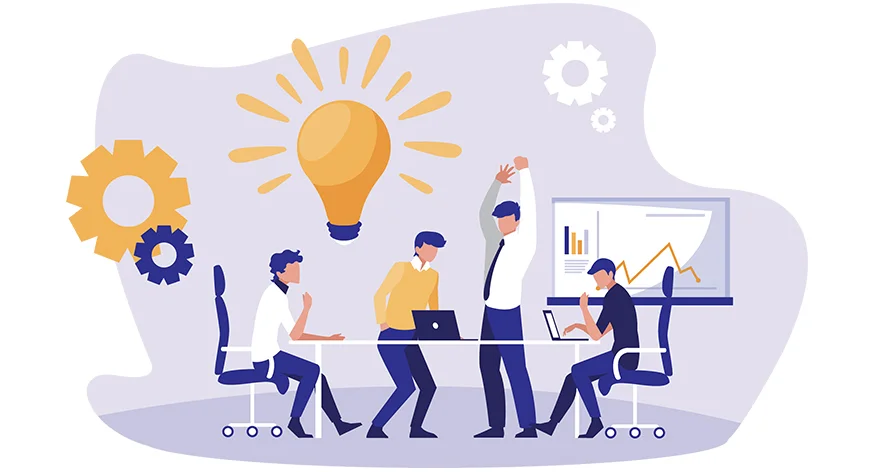We witness a widespread concern regarding the potential harm of the digitalization and increased use of artificial intelligence-based applications on company culture. However, it is observed that the digitalization and use of artificial intelligence do not necessarily harm the company culture and employees, but rather result in an increased motivation and commitment to the culture, as it speeds up the works, providing more convenience. For example, in an MIT study published on Forbes, 79% of the participants reported that utilization of artificial intelligence in business life has positive impacts on business culture and employee motivation. The research also demonstrated an rise in the quality of decisions and efficiency, accompanied by a positive change in cultural adaptation and motivation. To achieve this, the transition to the use of artificial intelligence must be performed in a way that will not affect the employee motivation negatively.
Digital business management platforms may make users nervous at first glance, yet they allow employees to focus on more critical and creative tasks and leave monotonous tasks to artificial intelligence. However, companies must be very careful in the transition process to make sure that employees do not feel threatened and that the process does not negatively affect their motivation to work and their commitment to culture. We have listed 5 important issues that you must handle carefully as an employer:
1. Make sure all employees feel safe
If your employees are not appreciated as they deserve, do not feel safe at work and do not consider their tasks meaningful, loss of motivation will be inevitable upon the introduction of artificial intelligence practices. Building a workplace culture that emphasizes the employee’s position as the most important part of the company and prioritizes acknowledging and appreciating them can help prevent such problems.
2. Do not forget about the transparency
Introducing artificial intelligence-supported applications in a workplace where all teams are informed about the transition in advance and asked for their opinions on the issue will be much more useful for preserving and maintaining the workplace culture compared to starting the use of artificial intelligence with a sudden decision. This will ensure employees show no behavioral change and, as a result, cause no harm to the workplace culture.
3. Provide employees opportunities to express their feelings and thoughts
We recommended creating a platform where each employee can freely express their feelings and thoughts about their duties and the general processes in the company and not just share the concerns caused by the digitalization of processes. Taking the feelings and thoughts of the employees will help keep the concerns about the introduction of artificial intelligence applications at a minimum level. Employees who feel that their ideas are valuable will not think that their position in the company is threatened but that they are performing important tasks for the company. As a result, the level of fear and concern caused by the increased use of artificial intelligence will be lower, and no decrease will be observed in employee motivation and commitment to culture.
4. Promote the use of artificial intelligence
In today’s world, people who learn to benefit from the practical aspects of artificial intelligence become more successful and stand out among their peers. So, promoting employees to use artificial intelligence will positively affect their motivation and commitment to the culture. While promoting employees to use artificial intelligence, it would be useful to emphasize that the use of artificial intelligence will free the employees from the responsibility of the more monotonous tasks and allow them to play an active role in tasks that are more critical and require creative skills unique to humans. Acknowledging performed tasks and celebrating achievements, as well-known aspects of workplace culture, are also significant in the transition process to artificial intelligence. Acknowledging and celebrating employees who adapt to artificial intelligence will make the process easier.
5. Emphasize how the artificial intelligence and digitalization will affect employees positively
The growth of a company should also mean an increase in the income of the employees. Companies can grow faster and thus boost their revenues with increased productivity and efficiency with the use of artificial intelligence-based applications. Emphasizing in advance that this increase in income will positively affect all employees of the company and paying bonuses to or increasing salaries of all employees following the growth will help keep their motivation high. Since the motivation of the employees is a factor that directly affects the workplace culture and adaptation to it, you can continue to preserve and keep your workplace culture alive, while you can grow much faster with the support of artificial intelligence.
In this article, we summarized how you can manage to avoid any negative effect on employees’ commitment to business culture while integrating artificial intelligence into your business life. You can make a smooth introduction of artificial intelligence into your company under the guidance of the 5 significant steps we have listed above. You can make sure that everyone in your workplace has a peaceful and safe working environment by following these steps, which focus on caring about the ideas and feelings of employees. Thus, you will be able to protect your culture while increasing efficiency with the use of artificial intelligence.




